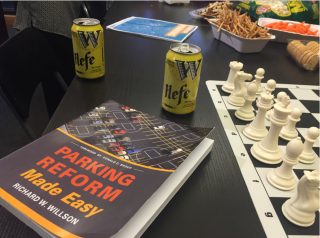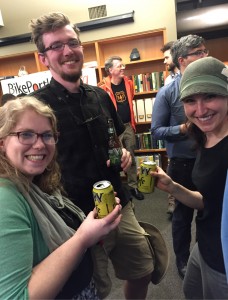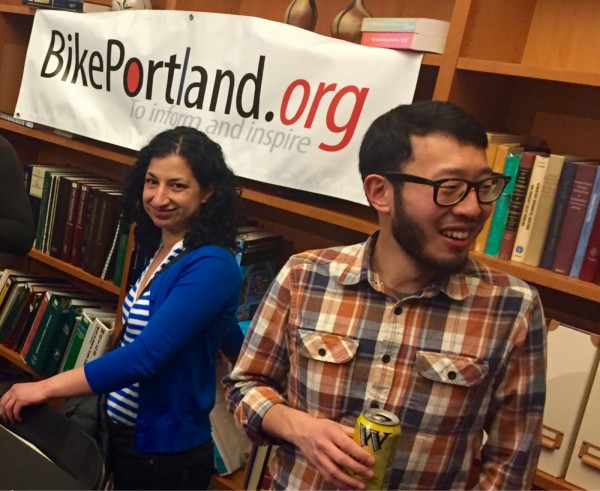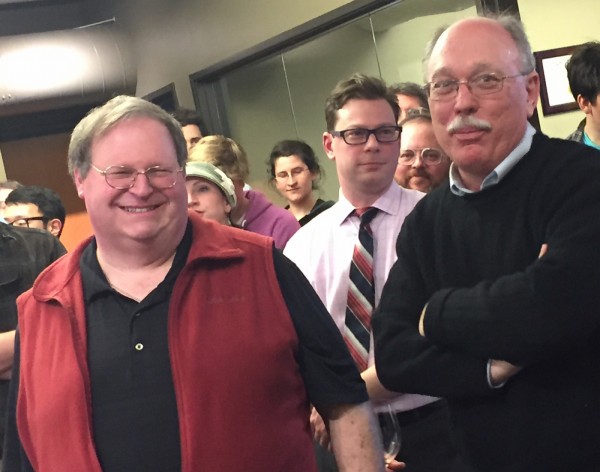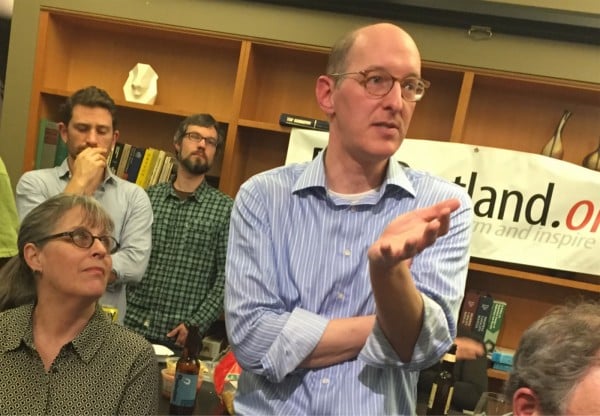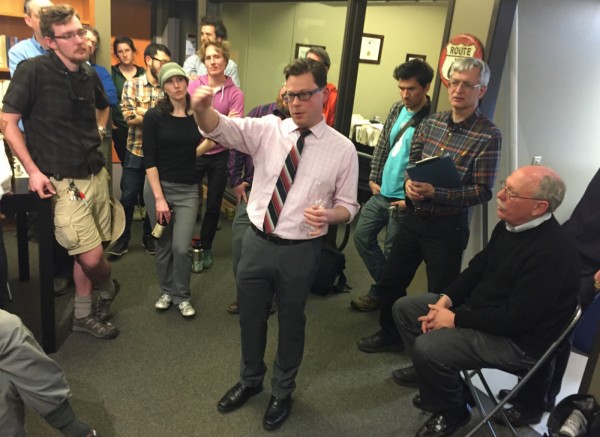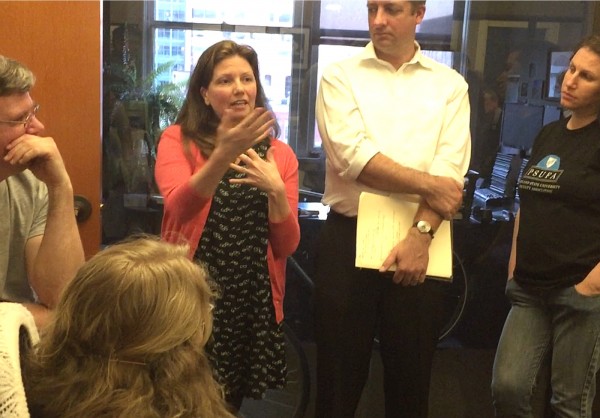Wonk Night is sponsored and hosted by Lancaster Engineering. Drinks for this month’s event were provided by Widmer Brothers Brewing, makers of Omission Beer.
On Tuesday night we brought together some of Portland’s most dedicated and whip-smart parking reformers for our monthly Wonk Night. It was a sincere pleasure to be in a lively room of about 50 people who all want Portland to do a better job using auto parking as a tool for good instead of evil.
We made auto parking reform the theme of Wonk Night because how we deal with this issue is directly related to bicycling in more ways than you might think. We all know that coveted curb lane people park cars in is prime real-estate that could be used for much more useful things like safe and protected bikeways; but parking policy goes way beyond cycling. It directly influences how our city grows and who the winners and losers are when it comes to street access. This conversation is also about the negative impact automobiles have on our public spaces. As we grow, we can either manage these spaces more effectively or we’ll continue to face higher housing prices, a lower quality of life, and the continued overuse of cars that is preventing our city from achieving its climate, transportation, and growth goals.
To help us wade through this topic, we invited four experts to join us:
– Chris Smith: Portland Planning Commissioner and veteran urban policy activist. Smith was invited to help us understand the city planning context of the issue.
– Tony Jordan: Founder of Portland Shoupistas, a grassroots community group organizing for progressive parking policy in Portland. Jordan was invited to help us see the issue from an activists perspective.
– Joe Cortright: President and principal economist at Impresa Consulting and contributor to City Observatory. Cortright was there to share his insights from a numbers and data perspective.
– Brian Davis: Senior transportation analyst at Lancaster Engineering and director of that firm’s Streetlab. Davis was invited to share his perspective on what it’s like on the front lines of executing a city’s parking policy as a paid consultant.
Before we get into the recap, here are a few photos of the faces in the crowd:
Advertisement
We started off with an overview of where parking reform stands in Portland.
The City of Portland is in the midst of their Citywide Parking Strategy project. It’s the first major parking policy overhaul since 1996. With so much change in the past 20 years and with so much at stake in the future it’s imperative for transportation reform activists — especially those who think our city will work better with fewer cars — now is the time to learn more about this topic and get involved with these discussions.
For about a year now, the city has been having committee meetings and doing analysis on several different fronts with the hope of integrating the results into their update of the Comprehensive Plan. The work boils down to two parts: a revamp of policies in the Central City; and a new approach to parking in and around “centers and corridors,” areas like the 28th Avenue commercial district, St. Johns, Hollywood, and the Mississippi district.
“Parking is a fertility drug for cars.”
— Chris Smith, City of Portland Planning Commissioner
Chris Smith started us off by recounting his recent victory against parking minimums in Northwest Portland. Smith made his stance on the issue very clear with the quote of the night: “Parking is a fertility drug for cars.” With that in mind he persuaded fellow commissioners to deny a request from northwest residents to institute a requirement for parking minimums similar to the policy passed by Mayor Charlie Hales and city council in 2013. That decision is seen by parking reformers as a huge mistake and early data shows it might have led to higher housing costs because housing developers either passed along the cost of the parking spaces to tenants or they built fewer than 30 units (thus limiting supply) in order to not trigger the parking requirement.
Smith said PBOT Commissioner Steve Novick and Director Leah Treat are now reviewing all the input and information gleaned in the process so far to prep for a presentation at City Council in June. As to how council members stand on the issue, “They want to do the right thing,” Chris Smith said, “but they have to balance that with other issues.”
Those “other issues” are things like outcry from some Portlanders who want more parking because they feel new development is gobbling up all the parking in their neighborhood. That issue is what got Tony Jordan interested in parking policy six years ago when his neighborhood around inner SE Division Street saw a massive apartment and condo boom. When people started fighting the increased density largely due to parking concerns, Jordan became an advocate for progressive parking policy. He now runs the Shoupistas and sits on several of the city’s parking advisory committees.
“[It’s] Better to give lower-income people a choice to pay rather than force them to pay by default.”
— Rebecca Hamilton
For the urban economist Joe Cortright, this is all the result of an increase in demand for cities. “The demand for urban living is increasing faster that we can create supply,” he said. If we have to include a parking space as we create that supply, Cortright said it adds on average $200-250 a month to the price of an apartment — whether you own a car or not. He said Oregon’s “inclusionary zoning for cars” is creating demand for car use. “We have traffic james in the U.S. for the same reason we had bread lines in Russia,” he said, making a point about the impacts of not pricing parking at what it actually costs society.
We talked a lot on Tuesday night about how parking policy impacts lower-income people. If you make parking spots more expensive (a position strongly favored by reformers) poor people won’t have a place a park. “How do you respond to that argument?” someone asked. There seemed to be a consensus around the room that higher-priced parking is better than the current scenario where everyone pays to subsidize parking whether they use it or not. Rebecca Hamilton said that it’s “Better to give lower-income people a choice to pay rather than force them to pay by default.”
Everone also seemed to agree that parking revenues should be spent on things like public transit and other system-wide improvements that have broad social benefits. Portland City Commissioner Amanda Fritz recently argued against raising parking prices downtown because she said poor service workers often need to drive after-hours when transit isn’t running. Iain Mackenzie said the best response to that is to use the extra parking revenue to fund a “night-owl” bus service. Tony Jordan added that during his time on the meter hike subcommittee he encountered a rep from the Service Employees International Union who was against higher rates. Jordan asked how many of their members didn’t own cars and she didn’t know the answer. The SEIU rep then shared an anecdote about a downtown worker who got off shift at 3:00 am and waiting at Subway until 5:00 am to take a bus home. “This anecdote led me to propose,” Jordan wrote us in an email follow-up after Wonk Night, “when I gave testimony to council supporting the increase, that they use the money for reduced income bus fare.”
Underscoring Jordan’s point, Zef Wagner with the City of Portland said when it comes to understanding how parking prices might impact low-income people, it’s always best to ask them directly instead of speculating about their needs and desires with other planners and activists.
Brian Davis, the engineer whose firm PBOT hired to analyze parking usage in northwest Portland said, “I get to be the bullshit detector for agencies.” One of the takeaways of his work was that parking spots have the highest turnover in places with the highest mix of nearby land-uses. The data he collected showed that there was no need for many of the two-hour parking spots in northwest. And it just so happened that PBOT’s Parking Operations Division Manager Malisa McCreedy was in the room too. “Brian’s analysis,” she shared, “informed our policy and we’ve removed many of the two-hour minimum spaces.”
Another topic someone brought up was how persuade the non-believers that parking should be more expensive. Davis said instead of focusing on how much parking costs will increase, “We need to rephrase it to, ‘How much would you pay to have a space?'” This framing jibes with Chris Smith’s advice that the argument will be lost if the focus is on using parking policy to discourage driving. Rather, he says, the focus should be on how better policy will make parking more available to those who really need it and — more importantly — are willing to pay a fair price for it.
Thanks to everyone who came to Wonk Night. Please share your takeaways in the comments and stay tuned for more coverage of this topic.
— Jonathan Maus, (503) 706-8804 – jonathan@bikeportland.org
BikePortland can’t survive without subscribers. It’s just $10 per month and you can sign up in a few minutes.

